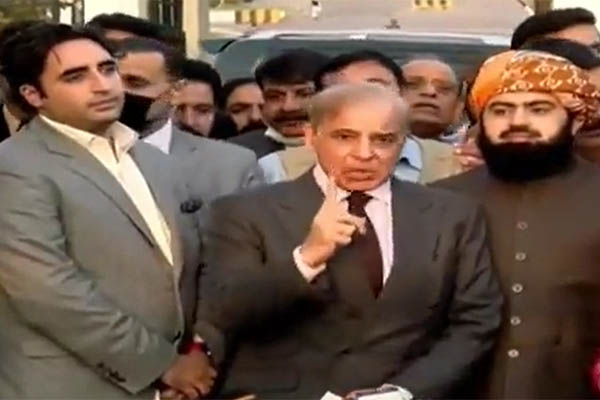
Opposition leaders address a press conference after a joint session of Parliament
PPP chairman claims government lacked numbers required to pass laws in joint sitting of Parliament
Pakistan’s opposition parties on Wednesday announced they will challenge the 31 bills passed in a joint sitting of Parliament in court, as the government urged them to “accept” that they cannot defeat it.
The treasury benches successfully passed 31 bills, including amendments to the Elections Act, 2017 that allow for the use of electronic voting machines in general elections, as well as granting overseas Pakistanis the right to post ballots via internet voting. Additionally, the government also passed a law allowing for the review and reconsideration of Indian spy Kulbhushan Jadhav’s spy conviction, in line with requirements of the International Court of Justice.
Addressing media after a walkout from the joint session, Leader of the Opposition in the National Assembly Shahbaz Sharif accused Speaker Asad Qaiser of “trampling” parliamentary traditions and “bulldozing” legislation. “Legislation cannot take place in such an atmosphere,” he said, and accused the speaker of counting fewer votes of the Opposition than were present in Parliament.
“We believe three or four additional votes were counted in favor of the government,” he said, adding that even with some absent members due to illness, more than 200 opposition lawmakers had attended the joint session.
Pakistan Peoples Party Chairman Bilawal Bhutto-Zardari said that the united opposition would challenge the bills in court, claiming the government had not had enough votes to pass them. “The NRO [national reconciliation ordinance] to [Indian spy] Kulbhushan Jadhav, election amendment bill, and all other bills will be challenged at every forum,” he vowed, adding that he believed the government had not won in Parliament.
Reiterating that he had tried to inform the treasury benches and the speaker that rules for joint sittings required more than half of the combined votes to get a law passed in Parliament, he said his statement was ignored. Detailing his argument, he said that the government needed a minimum of 222 votes to get any bill passed in a joint session, as the total number of lawmakers was 442.
Maulana Asad Mehmood of the Jamiat Ulema-e-Islam (Fazl), meanwhile, criticized the NA speaker for “not giving a chance to the Opposition to speak,” and accused the government of having “managed” the legislative process.
In a subsequent press conference, Information Minister Chaudhry Fawad Hussain urged the opposition to change its strategy and commence talks with the government, stressing that it should admit that “it cannot defeat us.”
Claiming that the government had been “forced” to pass controversial bills unilaterally, he blamed the opposition’s “attitude” for a failure to achieve consensus of all stakeholders. To a question, he said that while it would be “hard,” the opposition had a right to challenge the bills in court.
